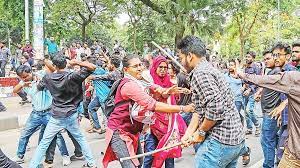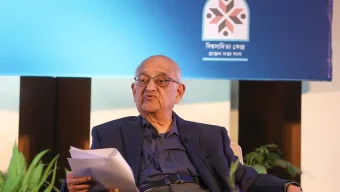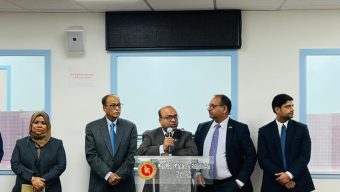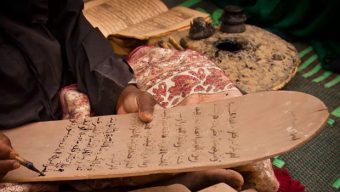In the final run, the side that wanted to beat up the opponents for insulting their leader, emerged the winning side. They created a battlefield on campus and beat up their opponents and drove Chhatra Dal out of the campus. Even the Chhatra Dal girls were not spared from the thrashing. After that the university authorities filed a case with no specific charges against the attackers. The police in the meantime made arrests, though not of the assailants carrying iron rods, knives and bamboos, but of those who were on the receiving end of the violence.
Such incidents have become the norm in the country’s highest seat of learning. While these assaults were taking place in the Shaheed Minar area, we teachers were not far away, casting our votes for the senate election being held in a festive environment. The candidates in this election even included some teachers accused of sexual abuse and corruption. There were three or four teachers who had second division or second class degrees. This is nothing surprising nowadays. In fact, many of them are even elected through our votes at times.
Certain other universities of the country are in the same state as Dhaka University, if not worse. Persons accused of serial sexual abuse or corruption are appointed to the highest offices and some, after being appointed to these top posts, continue with such offences even more.
These are now run-of-the-mill matters. Studies and research are least important. The news reports on universities are now about brutal torture in the student halls, unspeakable attacks on differing opinions, sexual abuse or corruption. Rather than centres of excellence in higher studies, the public universities have become forts to cling onto power. More important than studies is carrying out processions and displays of strength for those in power, or to provide student leaders with protocol. It is not those leading in research or academics, but blind followers or the ruling party who are appointed to top posts here. The outcome of this is reflected in our low position in international ranking of universities.
The state of primary or secondary educational institutions is equally deplorable. Exam question papers are being leaked, GPA-5 scores are being accorded en masse, there is the coaching centre business, irresponsible experimentation with exam systems, designing the syllabus on political considerations, irregularities in appointing teachers and lack of accountability of the educational institutions. All these have become the norm.
Awami League came to power in 2009 with the manifesto of change. Many had hoped that they would bring about an improvement in the country’s condition. That is evident in the statements made at the time by certain respected educationists of the country.
What had they hoped for? In a column published very recently in Prothom Alo, Professor Manzoor Ahmed reminded us about that. The respected educationists had included Professor Kabir Chowdhury, Zillur Rahman Siddiqui, Serajul Islam Choudhury, Anisuzzaman and Jamal Nazrul Islam. Almost all of them had been known as well-wishers of Awami League. They had perhaps actually believed that Awami League would give due consideration to the proposals they put forward in July 2010. The proposals actually deserved due consideration.
The very first sentence of their proposals called for harmful politics to be banished from the campus and for specific steps to be taken to implement the education policy with adequate funds. To this end, in the very first proposal they called for the direct and indirect link between Awami League and Chhatra League to be severed and for stringent measures to be taken against all criminal activities on campus, whether by students or non-students.
They identified certain points of the education policy put forward by the Awami League government on which there was common consensus and called for the immediate implementation of these. These included steps to ensure quality and equity-based education for all university students, ensuring scientific assessment of the students, ensuring adequate funds and proper use of the funds for the purpose, ensuring meaningful decentralisation and accountability in the primary and secondary education administration, and increasing the efficiency and dignity of the heads of all educational institutions.
They spoke of several steps to increase the skills of primary and secondary level teachers and to attract meritorious students to the teaching profession by including teacher preparation courses in the college degree curriculum, giving appointments for at least five years in teaching at attractive salaries upon completing the course, and forming a national teachers’ corps with them. They spoke about rising above short-term mentalities and subtle political considerations in order to implement these objectives. The respected educationists also proposed the creation of a permanent education commission accountable to the parliament and a significant increase in government funds for the education sector in order to implement the education policy.
They stated that all people of the country, including the conscious citizens, had huge expectations from the government and expressed their hope that the government of Sheikh Hasina would implement these proposals.
Professor Serajul Islam Choudhury is the only one living among these respected educationists. He told Prothom Alo that to the greater extent, these guidelines hadn’t been implemented and the reason behind that was that importance was not placed on the area of education. He spoke of the problems of denationalising and commericalising education, but he did not mention the politicisation of education and educational institutions.
To my mind, commercialisation of education is certainly a large problem. But an even bigger problem than that is the politicisation of education and the campus. A picture of that was drawn at the outset of this column. But its impact is even more widespread. For example, determining the syllabus of the schools, MPO inclusion, and recruitments in government schools — all of this is done more or less on political considerations. The situation is such that even if one doesn’t bother about studies and is an activist of the ruling party, then there is absolutely no fear of losing one’s job.
The most despicable form of politicising the campus is seen at the universities. There is a tradition of university students and teachers taking direct part in the country’s politics, and that is why those in power try to keep the universities in their control. Those who win questionable elections, those who remain longer to power, can do all this even more forcefully.
Perhaps it is because this effort to keep the educational institutions in their control that those in power are no eager to increase the excellence of these institutions. This is reflected in budgets higher for the police or defence than the pitiful budget for education. This is low even compared to other countries of South Asia. And anyway, a large chunk of this budget is spent in an unplanned manner or to appease the loyal followers of power politics.
The country’s policymakers are certainly concerned about excellence in education when it comes to their own children. For their own offspring they selected local and foreign immensely costly English medium schools. Some of their children go abroad for higher studies, living there in safety. Some of them return to the country and add to the talent of corrupt politics.
The strange thing is that after all of this, many people still laud those in power. In their own vested interests, those in power hand over hammers, helmets, knives and pistols to other people’s children, but still win praise round the clock. At times, even the ‘elite’ thinkers of society join in this praise out of their own interests or limitations.
These matters need to be spoken about by the educationists, by all conscious people. If not, no matter how much optimism is expressed, all this will finally amount to nothing. No matter how well thought-out proposals are made by these respected persons, these will become nothing but figments of imagination.
















